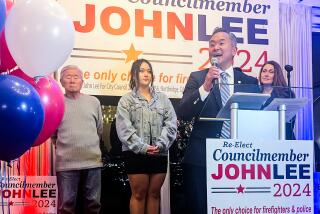Ridley-Thomas is far ahead in supervisor race
Mark Ridley-Thomas, who entered the race for Los Angeles County supervisor as a perceived underdog, opened a commanding lead over Bernard C. Parks in early returns Tuesday, propelled by his promise to be a more strident advocate for working people and by millions of dollars in labor support.
Unions spent $8.5 million using an independent committee to support Ridley-Thomas -- nearly nine times the amount raised by the candidate’s own campaign -- in a race to replace retiring Yvonne B. Burke in the 2nd District and fill the first open seat on the Board of Supervisors in 16 years.
The mood was celebratory at the Century Plaza Hotel, where Ridley-Thomas, a state senator, was joined by labor leaders on stage as he addressed the crowd.
“We want to thank them for what they’ve done to make the county of Los Angeles a better county,” he said. “Anybody that’s gotten the mistaken impression that I’m going to back up on my allies, they’ve got the wrong supervisor that they’ve elected.”
For Parks, a sitting Los Angeles councilman and a former chief of the Los Angeles Police Department, the early returns threatened to render a hard slap. He entered the race with higher name recognition than his opponent. Ridley-Thomas, however, cast the experience as a liability because of Parks’ opposition to a living wage measure, as well as the Rampart police corruption scandal that broke during his watch as chief.
In an interview Tuesday night, Parks appeared mindful of his possible return to the council, where he is serving a second term and offers an often contrarian voice.
“They will remember the campaign [for supervisor] as they do my public service -- it’s always going to be above-board,” Parks said. “That is a legacy I will cherish no matter what I end up doing. You have to live with yourself.”
Some voters said they respected Parks, yet found his campaign too placid.
“I think it’s time for Parks to step back,” said Jennifer Jackson of South Los Angeles. “You know, when he got fired [as police chief] by Mayor Jim Hahn, it seems like it took a lot of the fight out of him. He hung his head a little lower. We need someone who will fight for the people.”
The new supervisor will claim the most densely packed, ethnically diverse area in the county. It has 2.5 million constituents, and no black politician in California represents more people.
The district’s core lies in Crenshaw, Watts and Baldwin Hills, the heart of affluent black Los Angeles; around the edges are Marina del Rey, Culver City, Koreatown, Compton, Carson and Inglewood.
Parks’ strategists sought to build a coalition that has proved victorious in the past: older people, churchgoers and African American women.
Ridley-Thomas battled fiercely for those voters as well, aided by scores of get-out-the-vote operatives working for the high-spending labor alliance that supported him. At the same time, Ridley-Thomas sought to broaden his base with appeals to union workers, new voters and Latinos -- who make up two-thirds of the district’s population but only a quarter of its voters.
On the whole, the district’s population presents some of the most significant public policy needs in the region.
The area leads the county in residents who are homeless, receive Section 8 housing vouchers and live in unauthorized housing. More than 120,000 receive welfare assistance, and 225,000 use food stamps.
One of the most acute problems is the diminishing network of healthcare providers. Ridley-Thomas and Parks both placed the reopening of inpatient services at Martin Luther King Jr.-Harbor Hospital near the forefront of their campaigns, but neither presented a clear path to that end.
--
Times staff writers Molly Hennessy-Fiske and Evelyn Larrubia contributed to this report.
More to Read
Sign up for Essential California
The most important California stories and recommendations in your inbox every morning.
You may occasionally receive promotional content from the Los Angeles Times.











